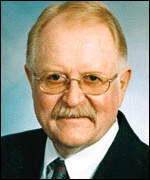

![]()
Pacific Perspective


![]()
Pacific Perspective
The dangers of
foreign investmentAn important part of Asian economic growth continues to be the cross-fertilization of investment equity, with its enhanced competition, technology transfer and employee skill development. The slowing of Japanese investment in Hawaii and on the mainland has been primarily a function of economic considerations.
The movement of equity in the other direction is now feeling the effects of international terrorism and the effects of the Bush war on it, but of greater consequence is the rising disorder in countries where international terrorism is ancillary.
Several recent incidents involving American investors in Asia remind us that all does not yet revolve around terrorism and the war on it.
In Irian Jaya, the far eastern province of Indonesia, two American and one Indonesian school teachers were killed in an ambush recently on the road leading to the Grasberg mine, the world's largest gold mine. The teachers were employees of Freeport McMoRan Copper and Gold, an American company that has developed the mine over the last 20 years.
The teachers were there because Freeport McMoRan, operating in an environment of racial and religious discord, has been providing social services -- like health care, public utilities, and education -- in an effort to bring development to the communities affected by the mine's operations.
While it is unclear exactly who the attackers were, it is clear that radical Islamists are not the culprits here. Some Papuan peoples of Irian Jaya have been in rebellion against the Indonesian government for more than 20 years and are active in the area. They are not Muslims. Other immigrants have entered the region while in flight from ethnic conflicts elsewhere in Indonesia and expanded the mix of alliances and cleavages in an already deeply divided tribal region.
In the midst of this social turmoil, Freeport McMoRan continues to employ 16,000 workers and pumps hundreds of millions of dollars into a desperate Indonesia economy.
Inherent in foreign investment today is the need by companies like Freeport McMoRan to manage the political risk in which they are immersed out of necessity. Company managers must try to stem human violence in the business environment, while at the same time efficiently handling the usual production and financial demands that face every investor.
Today's managers need training in cross-cultural communication, negotiations, social planning, security planning, religious studies and many other human resource skills that are something of a far reach from the usual accounting, marketing and management skills that were the usual menu of business schools.
At the other end of Indonesia, in Aceh Province in the north of Sumatra, the home of perhaps the oldest Islamic culture in East Asia, Exxon Mobile finds itself drawn into another social dilemma. In Aceh, the world's largest oil and gas company is caught in a crossfire between conservative and moderate Islam, between Indonesian subcultures with antagonisms that date back for centuries.
Facing pipe-bombings, kidnappings, bus hijackings, and guerrilla attacks in a conflict between Acehnese rebels and Indonesian soldiers, Exxon Mobile closed its operations in Aceh for four months this year. In the midst of age-old ethnic turmoil, the company suffered losses in excess of $350 million in revenue, much of which would have circulated back into the Indonesian economy.
Like with Freeport McMoRan, Exxon's managers must handle both political and operational risks, along with the usual financial and economic challenges that have historically come with the territory.
Hiring security forces? Negotiating with Acehnese? Balancing hiring between rival tribes? Building and operating schools and hospitals? The making of the modern investment manager in a global economy is nothing like it was just a generation ago. And if you want to be a manager in the global economy, by the way, are you paid up on your kidnapping insurance?
Llewellyn D. Howell is a senior research fellow at the University of Hawaii at Manoa Pacific Asia Management Institute and is international affairs editor for USA Today Magazine.